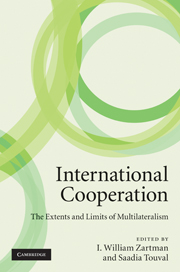1 - Introduction: return to the theories of cooperation
Published online by Cambridge University Press: 05 June 2012
Summary
Cooperation among states is much more common than war. Yet there is much less conceptualization about cooperation than there is about the causes of and behavior in war, and the study of international cooperation – attempts to understand the phenomenon – has produced much debate. “Conflict seems very natural, and it is easy to understand, … Cooperation, however, appears as a phenomenon that requires subtle explanations” (Hammerstein 2003, pp. 1–2).
Cooperation is defined here as a situation where parties agree to work together to produce new gains for each of the participants unavailable to them by unilateral action, at some cost. Its constituent elements are working together, agreement to do so (not just coincidence), cost, and new gains for all parties. (This definition is not too far from, but a bit more specific than, Webster's: “an association of parties for their common benefit; collective action in pursuit of common well-being.” Cf. Smith 2003; Clements and Stephens 1995; Dugatkin 1997). By “gains” we mean not only material gains, but also perception of progress toward goals, such as improved security, status, or freedom of action for oneself and the imposition of constraints on other actors, and so on. Thus, cooperation is used here to mean more than simply the opposite or absence of conflict, as some binary codings indicate. It is a conscious, specific, positive action.
- Type
- Chapter
- Information
- International CooperationThe Extents and Limits of Multilateralism, pp. 1 - 12Publisher: Cambridge University PressPrint publication year: 2010
- 3
- Cited by



